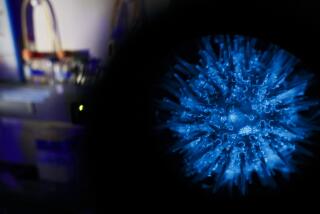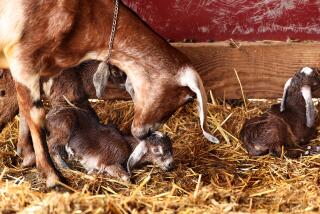Test-Tube Technology Moves Into the Barnyard : Genetics: Scientists hope to use the technique to improve growth rates and disease resistance, as well as to enhance milk and meat production.
ATHENS, Ga. — Willy and Nilly look like any two baby billy goats, munching on hay and gazing wide-eyed at the scientist examining their budding horns.
But Willy and Nilly are the world’s first test-tube goats. Their birth represents the next chapter in barnyard biotechnology, in their case, altering genes to breed goats with better milk.
“The sky’s the limit,” said Dr. Benjamin Brackett of the University of Georgia, cuddling a squirming kid.
“If we could alter the composition of goat’s milk just a bit, instead of nature’s most nearly perfect food, it would be perfect. Or people could get their medicine from milk. We have all sorts of ideas,” he said.
In a relatively new field, scientists are creating animals with genes different from their species. These transgenic animals are supposed to have better growth, better resistance to disease and improved meat and milk.
The results have been mixed.
“It’s an incredibly powerful technique, but it’s in its infancy,” said Dr. Richard Bowen of Colorado State University. “We have a lot to learn.”
He had to destroy a transgenic calf when a gene that made it more muscular began to kill it.
In simple animals, scientists just insert a new gene after they lay their eggs. Auburn University researchers inserted a growth gene into carp and catfish this way, making them grow bigger faster. Colorado State’s Dr. Barry Beaty is trying to introduce genes into mosquitoes that would prevent them from transmitting diseases such as malaria.
But it takes sophisticated fertility treatments to alter genes in larger animals. That’s where Willy and Nilly come in.
Scientists want to alter goats’ mammary glands so they produce milk with more vitamins or even medication in it.
Tufts University has bred a special protein into goat milk that doctors can use to make heart disease medicine. Researchers painstakingly extract a fertilized egg from a pregnant goat, inject the new gene, replant the egg and wait to see whether a transgenic kid will be born.
“Some come out transgenic and some do not,” said Donna LaVoie of Genzyme Corp., which bought Tufts’ research.
To be viable, there has to be a sure, fast way of breeding transgenic goats, University of Georgia’s Brackett said. So he figured out how to create them in test tubes.
Test-tube human babies have been a reality for more than a decade, but replicating that technology in animals has been difficult, Brackett said. Doctors have dozens of human eggs to work with, and they can add sperm when the eggs are ready.
But goats ovulate only one or two eggs. And the sperm has to mature at the same rate as the eggs and be added at the precise moment.
It took Brackett years to find the right way to handle this delicate reproduction, but now he can produce an embryo ready to be injected with new genes in just 15 hours.
Although Willy and Nilly, born in August, are not transgenic, Brackett’s technique clears the way for faster, easier reproduction of transgenic goats, he said.
“What he is doing is actually helping to increase the number of transgenic animals,” LaVoie said.
Next, Brackett wants to alter the genes in goats’ mammary glands so they produce milk with the few vitamins and amino acids now missing from nature’s almost perfect food, or to add proteins that drug companies can extract to make medicines.
“We’re all working on it now at the level of a mouse,” he said. “But I expect to see significant progress in the field in about five years.”
The government is furiously developing regulations to keep up, according to Alvin Young of the U.S. Department of Agriculture, which funds about $60 million in genetics research. Ensuring that transgenic animals won’t harm people or the environment will be paramount, he said.
“Many places are standing by ready to move the second guidance is provided,” he said. “One problem is public acceptance--the human food safety issues, the animal welfare issues.”
Animal welfare weighs heavy on the scientists’ minds as well.
People “expect us to be smart enough to make something perfect the first time,” Bowen said. “They view failures as kind of a Frankenstein thing.
“But in the history of science there were failures to develop the first vaccines and the first heart surgeries. The point is, transgenic technology holds a lot of promise for understanding normal biology and treating diseases.”
More to Read
Sign up for Essential California
The most important California stories and recommendations in your inbox every morning.
You may occasionally receive promotional content from the Los Angeles Times.










